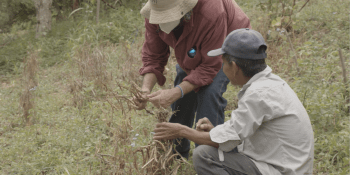The elephant in the room: Agriculture at the UNFCCC negotiations

Farmers and youth are key players in putting agriculture on the agenda in the UN Climate Talks
It is not always usual to find such a diverse group from different backgrounds, views and ages come together to discuss issues, especially in a small room. But when farmers, youth and the indigenous people’s representatives sat together with scientists, climate change negotiators and other stakeholders to discuss the future of agriculture in the UNFCCC negotiations, a vast diversity of views, aspirations and even clothing is exactly what was observed.
And, when it comes to ensuring that agriculture does not get locked out of a new United Nations global climate change agreement, such range of diverse views is needed to decide on the best way forward. To this end, a half-day workshop was organized on the sidelines of the recent UN Framework Convention on Climate Change (UNFCCC) negotiations in Lima Peru by the CGIAR Research Program on Climate Change, Agriculture and Food Security (CCAFS), to raise awareness on the status of agriculture in the negotiations and provide a networking space for farmers, youth representatives, and scientists.
View pictures from the event
For many years, agriculture has suffered neglect on the fringes of the COP negotiations, and many efforts to get it in via various negotiation streams or programs including Reducing Emissions from Deforestation and Forest Degradation (REDD+), the Clean Development Mechanism (CDM), have encountered stiff barriers. Although there has been progress in recent years in putting agriculture on the agenda, including agreement to to have discussions under SBSTA discussions in 2015, getting agriculture a real place at the table means taking a multi-pronged approach. And achieving this requires all sectoral stakeholders – farmers, scientists, youth groups – to engage their governments.
Read more: 10 Things you need to know about agriculture at December’s UN Climate Talks in Lima, Peru
However, the foundation for this active engagement can only be built on a strong awareness of the current issues and status of agriculture by all stakeholders; this is in addition to listening to farmers about how climate change currently affects them, and hearing their views on the best policy practices that work well for them. The level of engagement and enthusiasm in the room indicated that this was accomplished.
To start the discourse, Sonja Vermeulen – CCAFS Head of Research – gave a quick rundown of the past and present status of agriculture in the UNFCCC negotiations before yielding the space to George Wamukoya of the Common Market for Eastern and Southern Africa (COMESA) and James Kiyangi of CCAFS Regional Program Leader for East Africa who both recounted their first-hand experiences of involvement in the processes over the years and suggested ways forward based on that.
In discussing entry points for agriculture in the negotiations, Wamukoya explained the need to actively engage other stakeholders and platforms, particularly in the forestry sector. He pointed out that agriculture directly impacts forests, as in many continents it is one of the main drivers of deforestation which in turn increases carbon emissions. Thus, there is a need to engage forest specialists to acknowledge this and get agriculture into forest discourses at the COP negotiations.
From James Kiyangi’s viewpoint, the most important thing to do may be for stakeholders in agriculture to step back and ask themselves the question: “why do we want agriculture included in the UNFCCC negotiations?” There is a strong case for including it, he explained, because agriculture contributes to greenhouse gases emission and global warming which in turn affect farmers and their productivity. He highlighted that understanding this basic issue plus the need to increase productivity for food security in the face of climate changes and agriculture’s present contributions to GHGs demands its involvement in negotiations.
Many participants representing youth, farmers and the indigenous people had the chance to share their views. A participant from the Caribbean posited that agriculture in many developing countries of Central America and Africa has always been climate-smart, therefore these countries should be leading the way in agriculture negotiations rather than the less climate-smart countries of the global north.
For the youth, the view was that it is counter-productive to discuss agricultural sustainability unless agriculture is made more appealing to today’s youth who may have better capabilities for change. Farmers and indigenous people on their part believe there is a need for increased participation and engagement from stakeholder in decisions affecting them.
A youth delegate shares her views. Photo: G. Betancourt (CIAT).
In the end, it was generally agreed that there is a big equity issue in the agricultural debate, where different categories of farmers in different regions of the world have highly varying contributions to climate change. While some may be large emitters, others are in fact contributing to the solution. And while it is imperative to agree on the political direction of framing these issues, it is equally important that governments and stakeholders involve farmers at the negotiating table, as no lasting solution can be found without their involvement.
Oluwabunmi Ajilore is a research fellow and communications specialist working with CCAFS Flagship program on Climate-Smart agricultural Practices. He is based in Cali, Colombia.
CCAFS and partners were at the UN Climate Talks in Lima in December 2014 to share experiences and insights on agriculture and food security. Find out more and join the conversation online by following our COP20 blog, @cgiarclimate on twitter, on Facebook and Google+.




